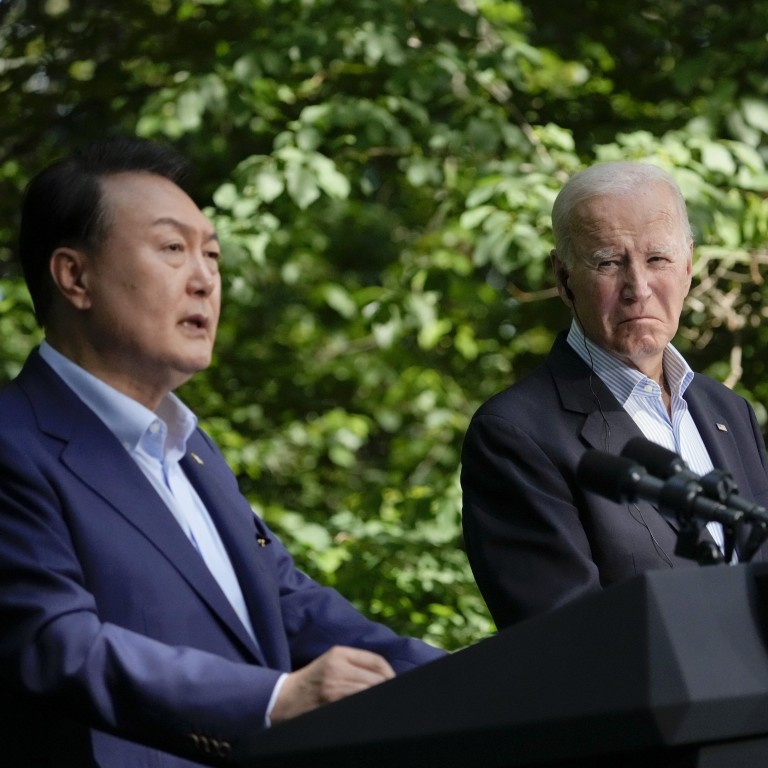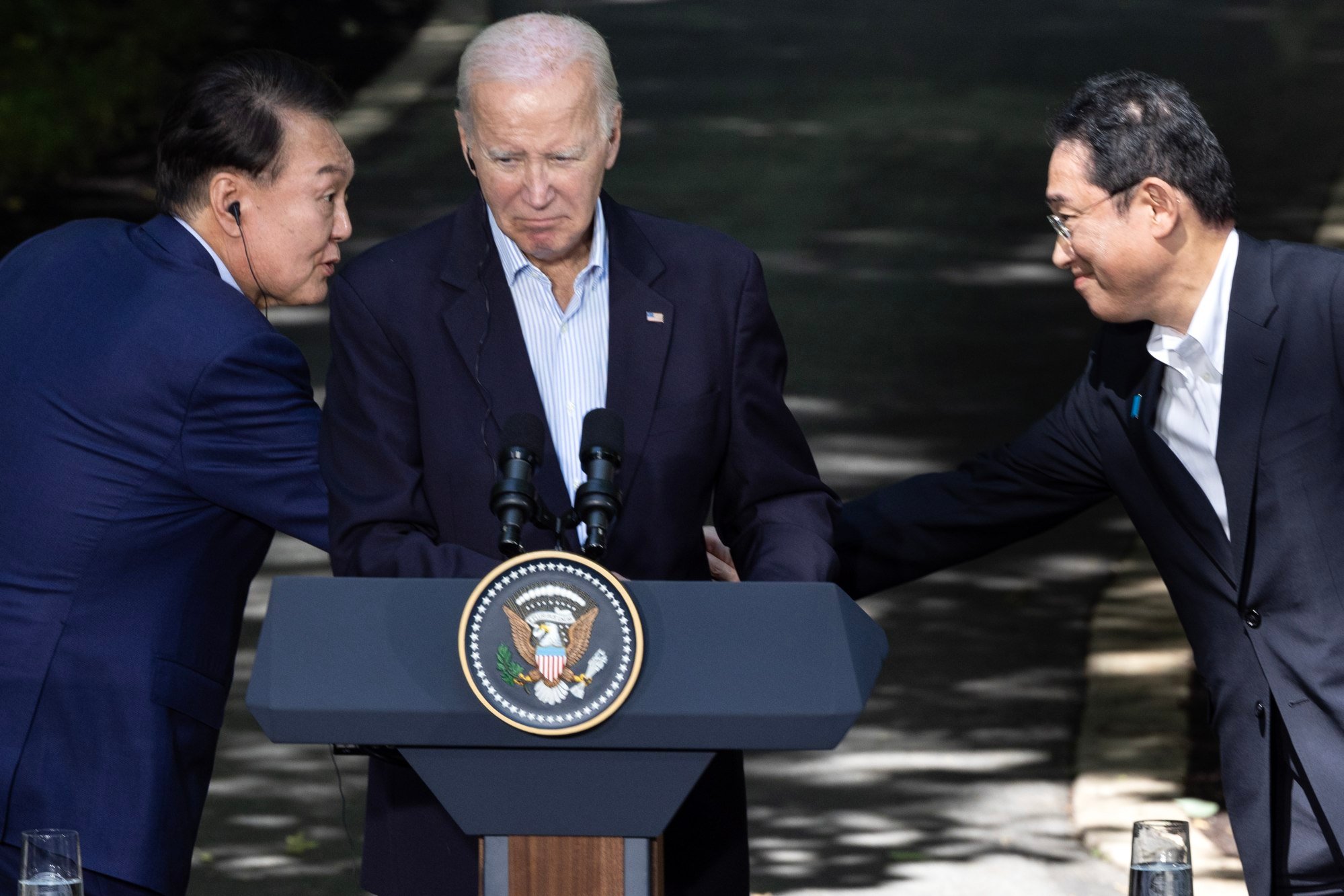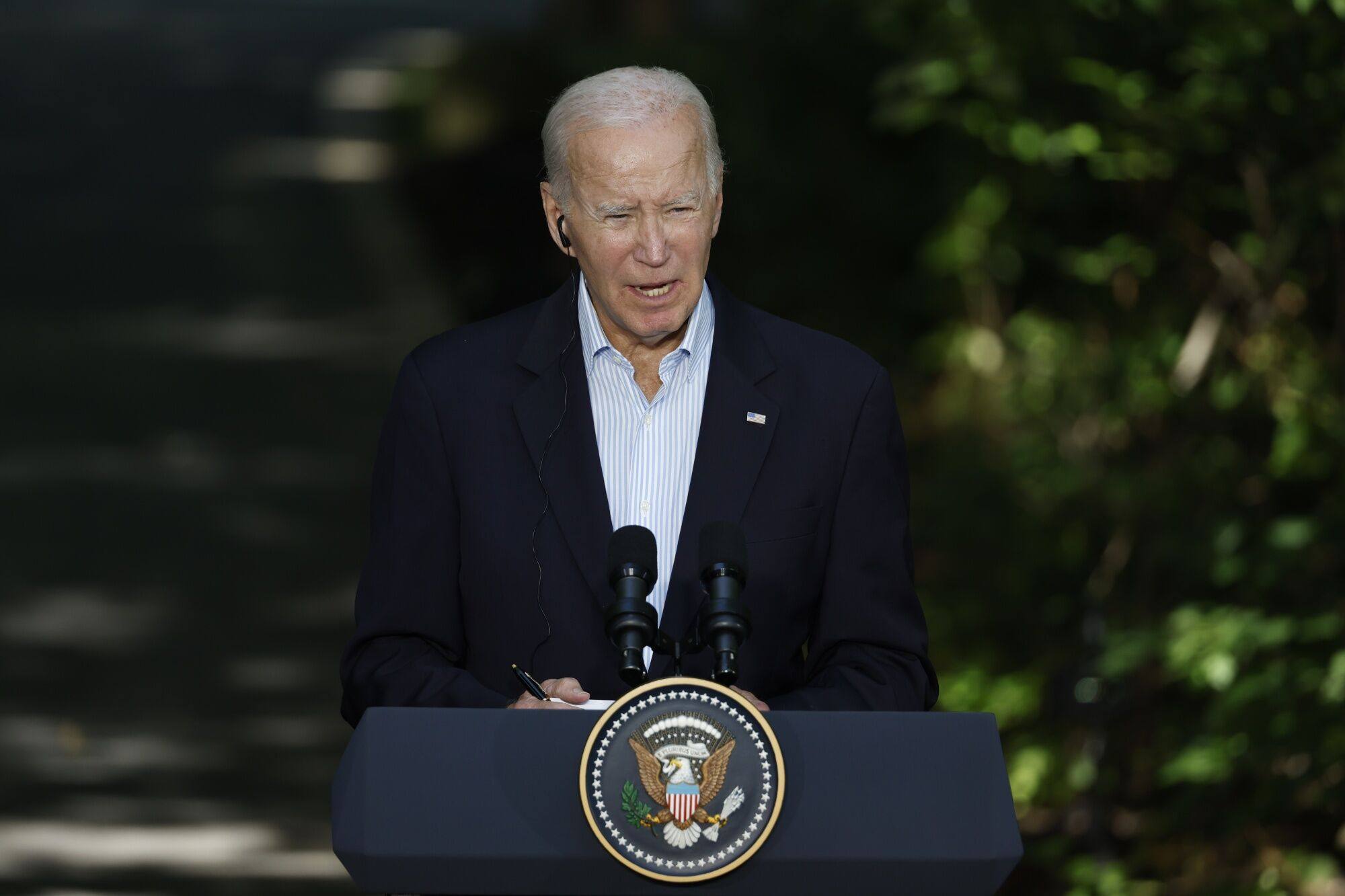
US-Japan-South Korea summit marks ‘new era’ that delivers on defence, diplomacy and tech
- Camp David principles deepening trilateral commitments set forth after first-of-its-kind meeting of Joe Biden, Fumio Kishida and Yoon Suk-yeol
- ‘This is not about a day, a week or month. This is about decades and decades of relationships that we’re building,’ Biden says
But they sent a clear signal that the three would do far more in times of crisis than “consult”, the language outlined in the summit joint statement.
“Today, we’ve made history,” said Biden at a joint news briefing at the summit’s conclusion. “Your leadership, with the full support of the United States, has brought us here because each of you understands that our world stands at an inflection point, a point where we’re called to lead, and new ways to work together, to stand together. And today, I’m proud to say our nations are answering that call.”

“We’re going to continue to seize those possibilities together, unwavering in our unity and unmatched in our resolve,” Biden said. “This is not about a day, a week or month. This is about decades and decades of relationships that we’re building.”
Since China has long benefited from historical tension between Japan and South Korea, this week’s show of trilateral unity – provided it lasts – complicates Beijing’s bid to expand its regional military and political muscle.
China fears fuel wish for larger American presence in Indo-Pacific: US envoy
Chinese Foreign Ministry spokesman Wang Wenbin said earlier on Friday in Beijing that China was opposed to “bringing confrontation and military blocs into the Asia-Pacific region” and that “no country should seek its own security at the expense of the security interests of others”.
“The Asia-Pacific region is a highland of peaceful development. It must never again become a battleground for geopolitical rivalry,” Wang said. “In the face of the volatile international security situation, all parties should uphold the concept of ‘a community of common security’, adhere to multilateralism and make concerted efforts to address various security challenges.”
The three leaders went out of their way to tout the benefits of the new three-way partnership for Southeast Asia and the Pacific Islands at a time when Washington and Beijing are competing for regional and global influence.

While the three have met several times on the margins of multilateral events, this is their first stand-alone summit and Biden’s first hosting of such an event at Camp David, the storied retreat near Washington steeped in diplomatic history.
“Camp David will be remembered as a historic place where the Republic of Korea, the United States and Japan proclaimed that we will bolster the rules-based international order,” said Yoon. “Today, we have agreed on the Camp David principles that will function as the enduring guidelines for our trilateral cooperation.”
Biden’s summit with Japanese, South Korean leaders looks to send ‘unity’ message
Supporters of the arrangement contend that the relationship could grow to rival Aukus and the Quad in significance, potentially overcoming what Washington has long considered a major impediment to regional security: its two strongest Asian allies bickering and at times unwilling to coordinate due to mistrust over Japan’s 1910-1945 occupation of the Korean peninsula.
“It’s actually a huge achievement given the history that Japan and [South] Korea had with one another,” said Jeffrey Hornung, a senior political scientist at the Rand Corporation, an American think tank. “Because they’ve always struggled with that, it’s always been a limitation on the US ability to try to strategise with these countries.”
Kishida and especially Yoon have staked significant political capital on the rapprochement, and the leaders made efforts Friday to give each other political cover.
China crushes US giant Intel’s acquisition of Tower Semiconductor
The three democracies are eminently aware that a change in government or public opinion in any one of their countries could seriously blunt or derail the security partnership – which has been largely credited to Yoon – particularly as polarisation, political violence and misinformation proliferate globally.
Anticipating that risk, Friday’s joint statement read more like a process and institution-building to-do list than a set of concrete “deliverables”. This was designed to make the ties sticky, comprehensive and embedded, bolstered by agreements at multiple levels of government and society so that they are anchored by annual summits and difficult to reverse.
Given their respective electoral calendars, Biden is potentially vulnerable earlier on this count than Yoon or Kishida.
“There’s not much if anything I agree on with my predecessor on foreign policy,” said Biden. “His ‘America First’ policy walking away from the rest of the world has made us weaker, not stronger. These results, I think, are going to keep it going.”
The administration was also hoping that the historic venue of Camp David would infuse some durability onto the nascent trilateral grouping.
PLA sorties force Taiwan’s military fuel budget up 55 per cent to US$344 million
“I expect and hope to follow up on our conversation in Bali this fall,” Biden said on Friday. “That’s my expectation”.
Analysts said Washington sought to create synergy between Friday’s partnership and its broader Indo-Pacific strategy.
“The US wants to leverage strong Japanese and Korean soft power and economic influence in these regions,” said Jeremy Chan, an analyst with the political risk consultancy Eurasia Group and a former State Department official. “I’m not sure how this will work in practice, but there are loads of potential ways that the three countries could cooperate.”
Closer unofficial ties? Taiwanese coastguard ship docks in Japan
The joint statement did not elaborate how Taiwan figured into the arrangement’s contingency planning, hotline activity or mutual commitments other than to call for stability and a peaceful resolution to cross-strait issues.
China views Taiwan as a breakaway province to be eventually united with the mainland, by force if necessary. Few countries, including the US, recognise the self-governing island as an independent state.
Relatively few foreign leaders have been to Camp David, located some 70 miles north of the White House, with an invitation considered something of a diplomatic coup. That should help both Asian leaders at home given the political risk they have taken with this rapprochement.
“Friendship with President Yoon, and the relationship of trust based on this, both countries as partners, should open up a new era,” said Kishida. “We’d like to continue such efforts.”
Additional reporting by Robert Delaney in Washington


